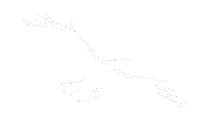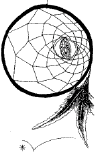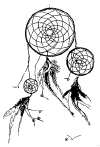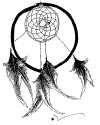Ojibwe Language
Because concepts in the Ojibwe language canít always be
translated into English, learning Ojibwe is the key to ensuring that Ojibwe
history and traditions are passed from one generation to the next. Indian
values, like sharing and taking good care of our resources, live on through
the language and benefit everyone ó Indian and non-Indian alike.
The Ojibwe language, with 6,000 verb forms, is highly
complex. In fact, in the 1992 edition of the Guinness Book of World Records,
the Ojibwe language was included under "languages most complex" for having
the most verb forms.
Ojibwe is also very descriptive. For example, the Ojibwe
word odaabaan-wigamig, which we translate as garage, actually means "a
building where the car is kept." And the word gidaga agoongoosens which we
translate into chipmunk, actually means "an animal that has spots between
the stripes."
Most of the people who can still speak the Ojibwe language
fluently are Elders. Many tribes fear that as their Elders pass away, the
language ó and the culture ó will die. The Mille Lacs Band realizes how
important it is to hold on to traditional culture and is therefore making
great strides to teach its children the Ojibwe language.
For example, all children in the Bandís day care and Head
Start programs and students in its Nay Ah Shing Schools receive Ojibwe
language instruction from language teachers and Elders. An innovative
language program for grades K-12 allows the Bandís Ojibwe speakers to work
with children from infancy to graduation on a regular basis.
And the Nay Ah Shing Schools have started an experimental
new learning program that focuses on the gifts of the Ojibwe culture,
particularly language. Through the program, students receive additional
training and support to achieve fluency in the Ojibwe language, and teachers
are taught the philosophy behind the language.
Thanks to the Bandís efforts, the Ojibwe culture and
language will survive, and both Indians and non-Indians will benefit from
understanding the rich history and values that are taught by the Ojibwe
people.
Indian Words
For most of us, English is the language we use every day.
But did you know that words which contain one syllable are the only original
English or Anglo-Saxon words? All of the rest of the words we use have come
from other tongues, including American Indian languages.
Indian words for animals were adopted into the English
language when Europeans first came to America. They had never seen many of
the animals and didnít have names for them. Therefore, they adopted American
Indian names like moose, caribou, raccoon, opossum, chipmunk, chigger,
cougar, and jaguar.
Explorers and English-speaking settlers also adopted
Indian words for plants and trees that were new to them: tobacco, tomato,
potato, hickory, pecan, mahogany, maize (corn), squash, avocado, papaya and
tapioca are are just some examples. All of these names were adopted from
different tribes and different American Indian languages.
Okay and blizzard probably originated with Indians, as did
the word Yankee (which meant English snake).
Indian geographical names are even more noticeable.
Alabama, Mississippi, Texas and Arizona were named by Indians. Some names
reflect the tribes which lived in the area, such as the Dakota, Illini,
Kansa and Massachuset.
Other names describe the land. Minnesota is Dakota for
"waters that reflect the sky," Michigan is an Ojibwe word for "great water,"
and Nebraska means "flat" in the Omaha language. Chicago is derived from an
Indian word for wild onions.
As the United States has adopted an array of cultures and
people, so has the English language. It may not be something you think about
everyday, but whenever you speak or write, you are using a language that
reveals a very unique history.
Difference Between Terms "Ojibwe" and "Chippewa"
Chippewa, Ojibwe and Anishinabe are three terms I often
hear Mille Lacs Band members use when speaking about their People. Why are
there different words? What do these words mean?
Some historians say the term Ojibwe originated from the puckered moccasin
that the Ojibwe were known for wearing and making. Others say that the word
refers to the Ojibwe language itself, because the word for the Ojibwe
language is Ojibwemowin. In addition to various interpretations of the
meaning, there also different spellings for Ojibwe, such as Ojibwa or
Ojibway. Despite these differences, an important part of the Ojibwe
tradition is respecting peoplesí answers to historical questions such as
this one.
Anishinabe is an Ojibwe word that means "spontaneously created" or "original
man." This term refers to all Indians living in North and South America,
including the Ojibwe. Ojibwe Indians often use the term Anishinabe (plural:
Anishnabeg) when referring to one another. Mille Lacs Band members usually
refer to themselves as Ojibwe Anishinabe because that is how Ojibwe people
have traditionally referred to themselves.
The word Chippewa probably came about as a mispronunciation on the part of
the white men who wrote and signed treaties with the Ojibwe Indians in the
1800s. Without a complete grasp on the Ojibwe language, these men referred
to the Indians as Chippewa instead of Ojibwe. The name Chippewa has stuck
and is still used today by both Indians and non-Indians to refer to the
Ojibwe people. Mostly, it is used in reference to treaties.
American Indian or Native American
A lot of people ask, "Which is the right term? Native American or American
Indian?"
Either term is acceptable, but individuals may differ on which name they
prefer. When Columbus landed on the shores of North America, he believed he
had found the East Indies, and he mistakenly called the people living on our
land "Indians." Today, many Indian people prefer to call themselves American
Indian to clarify their identity.
On the other hand, some native people prefer not to use the word ĎIndianí
because it is associated with stereotypes and mistaken perceptions. Those
individuals may call themselves Native Americans.
The most common terms used today are American Indian, Alaskan Native, Native
Hawaiian, and Pacific Islander.
Although it is a matter of individual preference, the Minnesota Chippewa
Tribe prefers the term American Indian. More than 560 tribes remain in the
United States and many have different words in their own languages for the
original inhabitants of this land which they called "Turtle Island."
However, the Ojibwe call all Indians "Anishinabeg" which means "original
man" or "first peoples."
White Eagle Soaring: Dream Dancer of the 7th Fire







 Get
a course to promote your business online, explode your sales
Get
a course to promote your business online, explode your sales Get
software to promote your business online in less time
Get
software to promote your business online in less time Get
software to streamline your business and run it hands free.
Get
software to streamline your business and run it hands free.